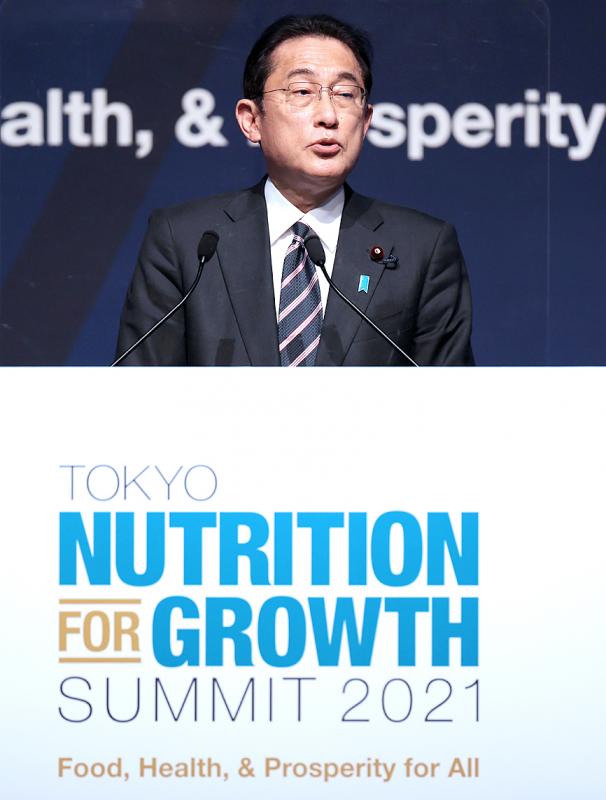Japanese Prime Minister Fumio Kishida apologized for the government’s mishandling of economic data after media reports said that it had for years overstated construction order figures, a key number set used to calculate economic growth.
“This is extremely regrettable and we need to examine how it occurred to ensure it doesn’t happen again,” Kishida told the National Diet yesterday.
The Japanese Ministry of Land, Infrastructure, Transport and Tourism has been double counting some data in its monthly construction orders survey, Japan Broadcasting Corp reported, citing unidentified people familiar with the matter.

Photo: EPA-EFE
The monthly release of orders from about 12,000 contractors is of particular importance for the government, given that it feeds directly into the calculation of GDP.
The overstating of the data goes back as far as eight years, the Asahi newspaper reported.
Kishida told lawmakers that the ministry had corrected last year’s figures.
It is not the first time Japan has mishandled data — the Japanese Ministry of Health Labor and Welfare published erroneous wage figures in 2018, leading to a massive reassessment of other economic releases.
“The accuracy of data is an important issue we need to take seriously,” Kishida said.
Japan said in 2019 that it would review the handling of all of its economic statistics after incomplete wage data saw it shortchange about 20 million welfare recipients by about US$525 million.
While it is still unclear how much data revision might have occured this time from the overstated construction figures, IHS Markit economist Harumi Taguchi said that developments point to strains in Japan’s system to collect statistics.
“We’ve already had this problem in the past with wages data, but we need to ask why do these things happen, how was it not noticed for so long and why haven’t past problems led to improvements?” Taguchi said. “Unless the country becomes really serious about this, the system will face institutional fatigue.”

Sweeping policy changes under US Secretary of Health and Human Services Robert F. Kennedy Jr are having a chilling effect on vaccine makers as anti-vaccine rhetoric has turned into concrete changes in inoculation schedules and recommendations, investors and executives said. The administration of US President Donald Trump has in the past year upended vaccine recommendations, with the country last month ending its longstanding guidance that all children receive inoculations against flu, hepatitis A and other diseases. The unprecedented changes have led to diminished vaccine usage, hurt the investment case for some biotechs, and created a drag that would likely dent revenues and

Macronix International Co (旺宏), the world’s biggest NOR flash memory supplier, yesterday said it would spend NT$22 billion (US$699.1 million) on capacity expansion this year to increase its production of mid-to-low-density memory chips as the world’s major memorychip suppliers are phasing out the market. The company said its planned capital expenditures are about 11 times higher than the NT$1.8 billion it spent on new facilities and equipment last year. A majority of this year’s outlay would be allocated to step up capacity of multi-level cell (MLC) NAND flash memory chips, which are used in embedded multimedia cards (eMMC), a managed

CULPRITS: Factors that affected the slip included falling global crude oil prices, wait-and-see consumer attitudes due to US tariffs and a different Lunar New Year holiday schedule Taiwan’s retail sales ended a nine-year growth streak last year, slipping 0.2 percent from a year earlier as uncertainty over US tariff policies affected demand for durable goods, data released on Friday by the Ministry of Economic Affairs showed. Last year’s retail sales totaled NT$4.84 trillion (US$153.27 billion), down about NT$9.5 billion, or 0.2 percent, from 2024. Despite the decline, the figure was still the second-highest annual sales total on record. Ministry statistics department deputy head Chen Yu-fang (陳玉芳) said sales of cars, motorcycles and related products, which accounted for 17.4 percent of total retail rales last year, fell NT$68.1 billion, or

In the wake of strong global demand for AI applications, Taiwan’s export-oriented economy accelerated with the composite index of economic indicators flashing the first “red” light in December for one year, indicating the economy is in booming mode, the National Development Council (NDC) said yesterday. Moreover, the index of leading indicators, which gauges the potential state of the economy over the next six months, also moved higher in December amid growing optimism over the outlook, the NDC said. In December, the index of economic indicators rose one point from a month earlier to 38, at the lower end of the “red” light.